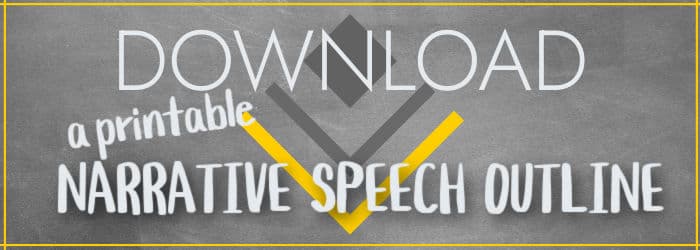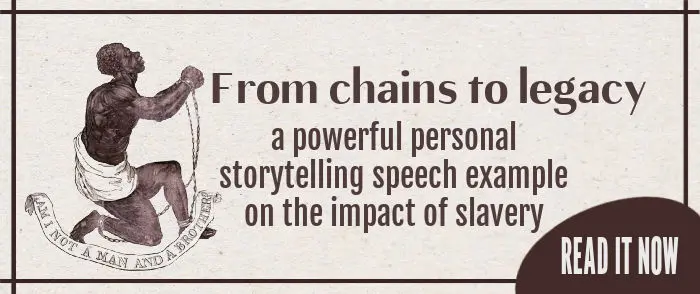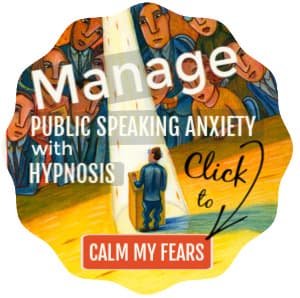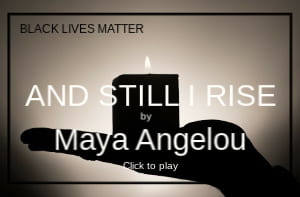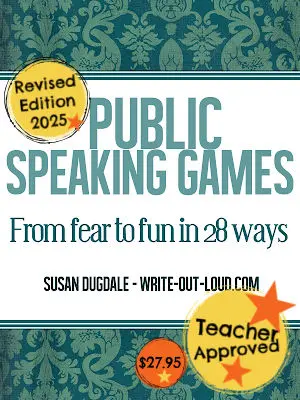- HOME ›
- Speech topics ›
- examples of narrative speech topics
Examples of narrative speech topics
125 strong ideas for effective personal storytelling speeches
By: Susan Dugdale
Narrative speech topics are topics especially designed to trigger telling a story.
And who doesn’t love being told a good story? They’re universally appreciated. It’s the oldest, most effective way of emphasizing a point, illustrating an idea or recounting an event.
For as long as there have been people in the world, there have been people telling them stories: storytellers.
What's on this page:
- 125 examples of narrative speech topics:
- 40 'first' experiences,
- 40 tell-a-story topics,
- 35 personal story ideas - How to best use this page
- Choosing the right narrative speech topic
- How to get from topic to speech (with a printable speech outline to download)
- A definition of the word 'narrative'
- A personal story is a powerful story
- The difference between an anecdote and a story
- Additional resources for storytelling speeches - including an example speech: From chains to legacy - the impact of slavery.
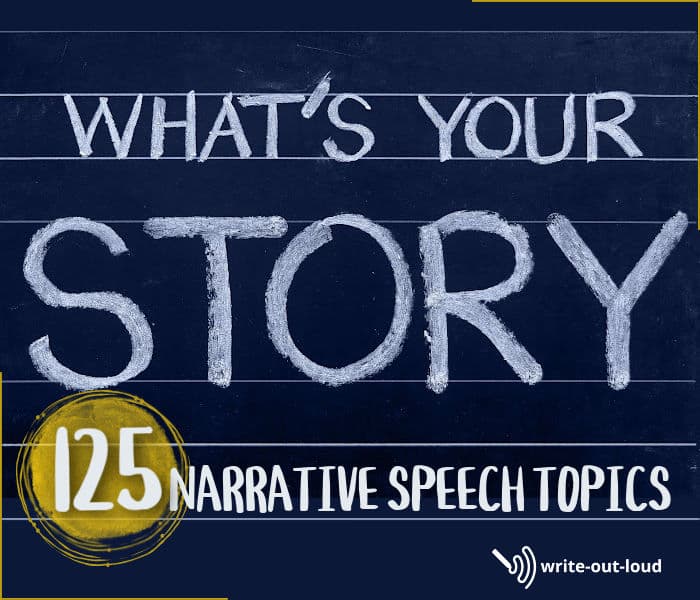
How to make best use of this page
Browse the topics and make a shortlist of any that appeal to you. (These are the ones that will immediately have you thinking of stories you could share.)
Make sure you download the printable narrative speech outline. Then take what you need from the other information. (If you've never given a narrative or storytelling speech before, read all of it!) It's here to help you put together the best speech you possibly can. ☺
A personal story is a powerful story
The most powerful stories to tell are personal. They’re the game changers, the significant events: meetings, accidents, cultural jolts, and life lessons that have made an impact.
They’re stories about family, our children, love, marriage, politics, education, work, living in society, philosophy, the natural world, ...
In telling these stories we reveal aspects of ourselves: sharing our innermost thoughts and feelings.
To give a good narrative speech, one that fully engages our audience we need to:
- choose a meaningful story with strong characters they can relate to in a situation they’ll recognize and identify with
- use vivid language enabling them to easily picture and feel what’s happening
A definition of the word 'narrative'
NOUN
A spoken or written account of connected events; a story: "a gripping narrative"
Word with similar meanings: account, story, tale, chronicle, history, description, record.
(Definition from Oxford Languages)
Choosing the right narrative speech topic
Because narrative speeches are often stories about ourselves we need to think carefully about what we share and with whom.
Some subjects are sensitive for many reasons. And what could be completely appropriate in one setting could be quite wrong in another.
As the giver of the speech, you’ll want to be clear about what you’re sharing and why.
Additionally, an emotional narrative speech exposing your own deeply felt and unresolved issues would be difficult for an audience to witness.
They’d want to help, send you to a therapist, leave... People do not want to feel embarrassed or uncomfortable on your behalf.
The right narrative topic idea is one you know your audience will want to hear, fits the speech purpose you’ve been given, and one you feel comfortable sharing.
Should you decide to use someone else's story for your speech be sure to acknowledge whose it is and where you got it from.
Getting from topic to speech
Once you’ve decided on your topic, the next step is developing a story outline. That involves carefully thinking through the sequence of the story, or what you’re going put in it, scene by scene and why, from beginning to end.
To help you do that easily I've put together a printable narrative speech outline. To download it click on the image below. (The pdf will open in a new window.)
The outline will guide you through each of the steps you need to complete. (Instructions are included.)
Rehearsal, rehearsal, rehearsal
Once your outline is done, your next task is rehearsing, and then rehearsing some more. You’ll want to know before you give the speech that it:
- makes sense and can be followed easily,
- grabs and holds the audience’s attention, is relevant to them,
- and easily fits the time you’ve been given.
Rehearsal lets you find out in a safe way where any glitches might be lurking and gives you an opportunity to fix them.
It also gives you time to really work at refining how you tell the story.
For instance, what happens if this part is said softly and slowly? Or if this bit is delivered more quickly, and that has a long pause after it?
And what about your body language? Are you conscious of what you’re actually doing as you speak? Do you ‘show’ with your body and how you use your voice, as well as ‘tell’ with your words?
The way you tell a story makes an enormous difference to how it is received. A good story can be ruined by poor delivery. If you make the time to practice, that’s largely avoidable.
- For more on how to rehearse – a step-by-step guide to rehearsing well
- For more on the vocal aspects of speech delivery
- For more on developing effective body
language
The difference between an anecdote and a story
Many people share an anecdote thinking they’re telling a story. They’re not. Although they have similarities, they are different.
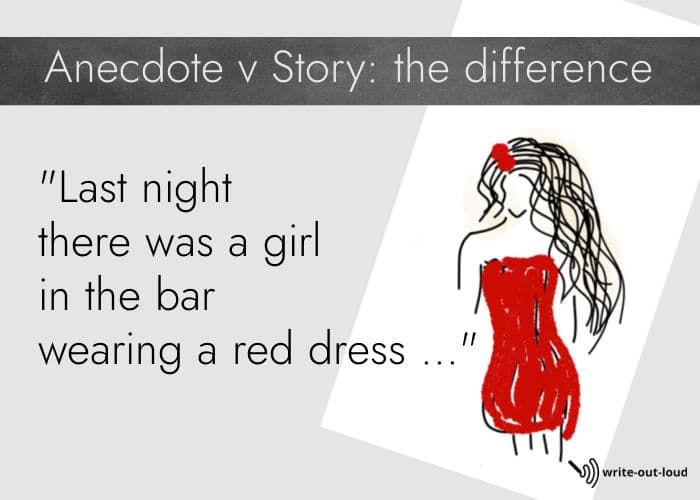
An anecdote is a series of facts, a brief account of something that happened. It is delivered without interpretation or reflection. It’s a snapshot cut from a continuum: a slice of life. We’ve taken notice because it was interesting, strange, sad, amusing, attractive, eccentric...to us. It captured our attention in some way.
For example:
"Last night there was a girl in the bar wearing a red dress. She ordered a brandy. After she finished her drink, she left."
In contrast, a story develops. It travels from its starting place, goes somewhere else where something happens, and finally arrives at a destination. A story has a beginning, a middle and an end. It moves. Things change.
Here’s the same anecdote example reworked as a very brief story. The person telling it is reminiscing, talking about the past to girl called Amy.
"Last night there was a girl in the bar wearing a red dress—so young, so gorgeous, so full of life. Seeing her whirled me back to us. You and me and that song. Our song: Lady in Red. “The lady in red is dancing with me, cheek to cheek. There's nobody here, it's just you and me. It's where I want to be.”
The complete and abrupt shift from present to past overwhelmed me. Thoughts, feelings, memories... At twenty-five and twenty-six we knew it all and had it all.
When I looked up, she’d finished her drink and gone. Oh, Amy! What did we do?"
Narrative speech topic ideas: 40 firsts
Often the first time we experience something creates deep lasting memories. These can be both very good and very bad which makes them an excellent foundation for a gripping speech.
We love listening to other people’s dramas, especially when they’ve gone through something significant and come out the other side strengthened – armed with new knowledge.
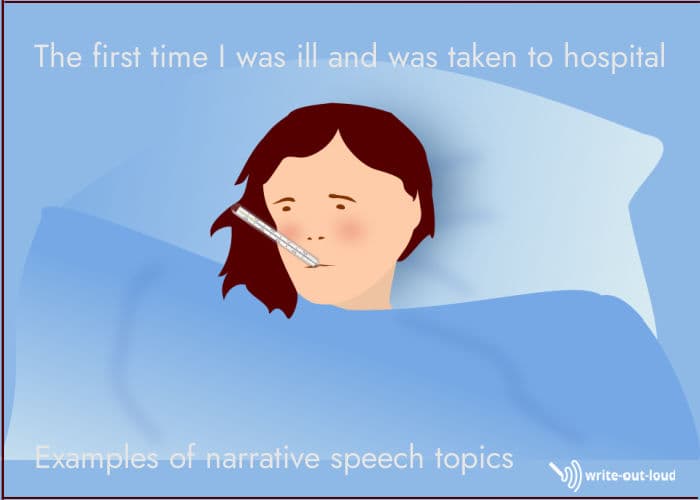
- The first time I stood up for myself.
- The first time I drove a car.
- The first time I rode a bike.
- The first time I fell in love.
- The first time I felt truly frightened.
- The first time I realised my family was different.
- The first time I understood I was different from other kids.
- My first day at a new school.
- The first time I felt truly proud of myself.
- My first date.
- My first job interview.
- The first time I realised no matter how hard I tried I was never going to please, or be liked, by everybody.
- How I got my first paid job.
- What I did with my first pay.
- My first pet.
- My first real fight- what it was about, and what I learned from it.
- The first time I tried hard to achieve something and failed.
- The first time I realised some people are not to be trusted.
- The first time I was away from home on my own.
- The first time I had to ask a stranger for help.
- The first time I experienced what it’s like to have someone close be either seriously ill or die
- The first time I was ill and was taken to hospital.
- The first time I felt utterly filled with happiness.
- The first time I was sincerely impressed and influenced by another person’s goodness.
- My first pin up hero.
- My childhood home – what I remember – the feelings and events I associate with it.
- The first time I realised the color of my skin, or the shape of my body, or my face, or my gender, or anything else about me, made a difference.
- The first time I tried to communicate with someone who did not speak my language.
- The first time I saw snow, the sea, climbed a mountain, camped out under the stars, walked a wilderness trail, caught a wave...
- The first time I visited another country where the language, customs and beliefs were vastly different to my own.
- The first time I understood and experienced the power of kindness.
- The first time I told a lie.
- The first time I understood how fortunate I was to be me.
- The first time I realised my goals and aspirations were attainable.
- The first time I realised having enough money to do whatever I wanted could not buy happiness.
- The first time I realised that some people were always going to be better at some things that I was.
- The first TV show/film/book I loved and why.
- The first time I really understood I was prejudiced.
- The first time someone stepped up for me – what that felt like, and what it changed.
- How first impressions of people and/or an event are not always right.
40 tell-a-story speech topics
Here's another 40 narrative speech suggestions. Give yourself time as go through them to consider suitability of the stories they trigger. Would what you're thinking of suit your audience? Does it fit your overall speech purpose?
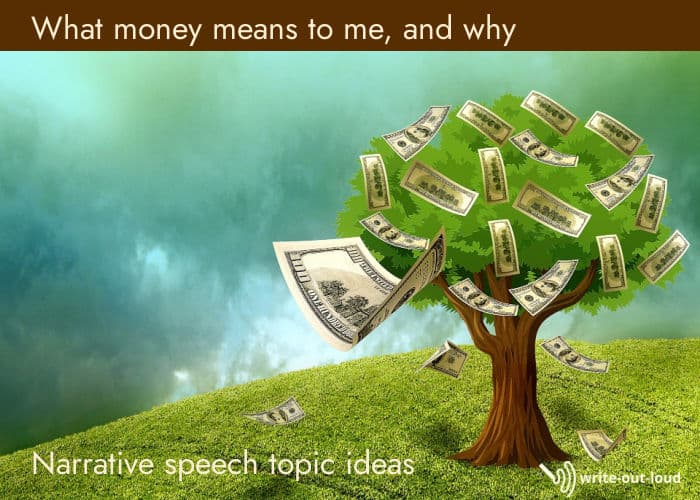
- How I learned to stand up for my own beliefs.
- How my name influenced who I am.
- My favorite teacher – why, what did they do? How did that make you feel?
- When and how I learned being adult does not mean being grown up.
- Why winning is important to me.
- What terrified me as a child.
- How I learned to manage my anger.
- What people regularly assume about me and how that makes me feel.
- How having an animal to love made me a better human being.
- How humor defuses tension.
- What it feels like to rebel against authority, and why I do it.
- My learning break through.
- How I discovered what meant the most to me.
- How I learned my family was poor, rich, odd, ...
- When I fully realized the importance and power of community.
- What I learned through living through my parent’s divorce.
- My experience of being an outsider.
- My favorite way to unwind.
- A decision I made that I now regret and why.
- How goal setting has helped me achieve.
- My safe place.
- What being unfairly punished taught me about myself.
- Rituals that serve me well. For example, always cleaning my teeth a particular way, always sorting my clothes out for the following day before I go to bed, always making Christmas presents for my family, ...
- What money means to me and why.
- How being a parent fundamentally changed me,
- What being the underdog taught me.
- Why I chose my own path, and not the one my parents wanted for me,
- Why family celebrations are important to me.
- Why I adopted a child.
- What religion means to me.
- What marriage, friendship,... means to me.
- What needing to be helped has taught me.
- Why and how I support giving back to the community.
- Tricks I use to get myself to do things I know I should do but don’t really want to.
- What I do to manage fear or anxiety of public speaking.
- How I learned to stop biting my finger nails or stop some other behaviour driven by nervous anxiety.
- How I learned to stop feeling like my job in life was to make my parents or anybody else feel happy.
- What having a job as a young person taught me.
- The complications of being the favorite child in your family.
- The difficulties of having to choose between friends.
35 more narrative or personal story speech topics
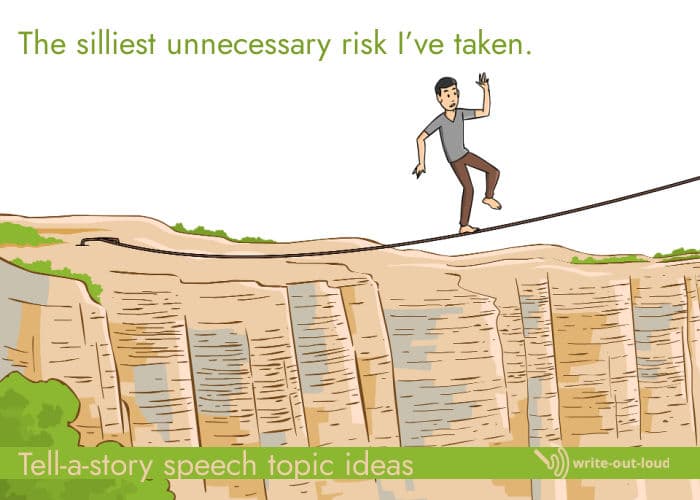
- The time I made an assumption about a situation or a person and got it entirely wrong.
- What being totally and suddenly out of my depth in a situation felt like and the consequences.
- A lesson I learned the hard way that helped me become a better person. For example: over spending, driving too fast, drinking too much, being caught out in a lie...
- Important things I learned through keeping old people company.
- What I learned through losing a good friend
- What coming face to face with my own mortality taught me.
- How the language of kindness transcends language and cultural differences.
- What being ashamed of my own behaviour taught me.
- How I unknowingly broke local cultural customs while overseas and what happened
- How taking revenge for a wrong did not right it.
- The silliest unnecessary risk I’ve taken.
- How first impressions are not always right.
- How pretending to be strong (fake it until you make it) can work very well.
- What I really wanted my parents to do for me and they didn’t.
- How our clothing influences how other people perceive us.
- My earliest memories: what they were, how they made me feel.
- Why I became disillusioned about politics.
- Why I decided to go into politics.
- The influence of music on my life.
- A personal phobia and how it impacts on my life: fear of spiders, fear of the dark, fear of thunder...
- The impact of peer pressure on decision making.
- What I’ve learned about gratitude.
- How I lied in order to cover for a friend and what happened.
- My most embarrassing moment and how I survived it.
- The worst day of my life: what it taught me.
- How I know peer pressure can make us behave in ways we don’t really want to.
- How I learned to read people.
- Why saying thank you is important.
- Random acts of kindness and generosity.
- Being lost in a strange city.
- What I learned through genuinely apologizing for something I did.
- How the way a person speaks influences what we think about them.
- How a mentor changed my life.
- The most thrilling exciting thing I’ve done.
- How being a leader and being looked up to felt.
Other resources for narrative speeches
Articles on this site:
- 60 vocal variety and body language speech topics - speech ideas to encourage excellent storytelling
- Storytelling setups: what works & why - How to open or lead into a story
- How to effectively use a small story as part of a speech
- Tips and exercises for working with and improving body language
- Simple characterization techniques for compelling storytelling
- 9 aspects of vocal delivery - explanations, tips and exercises to improve your voice
- How to rehearse well - step by step guidance
Offsite storytelling speech resources
Toastmasters Project | Connect with storytelling – Level Three
- Connect with Storytelling – District One (district1toastmasters.org)
- 8300-Connect-with-Storytelling.pdf (toastmasters-lightning.org)

About the Author: Susan Dugdale, founder of write-out-loud.com, is a qualified teacher of English and drama with over 40 years of experience. Drawing on her professional expertise and her personal journey from shyness to confidence, Susan creates practical, real-world resources to help people find their voice and speak with power.
